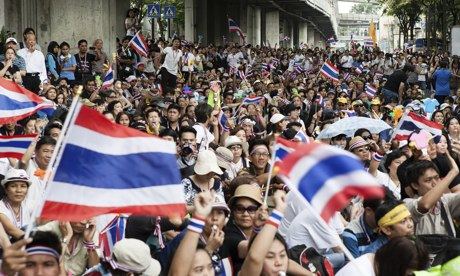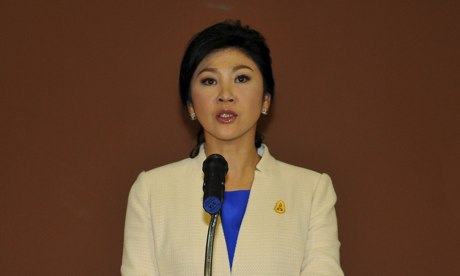- Joined
- Sep 19, 2013
- Messages
- 411
- Points
- 0
Thai prime minister evokes security law after protesters occupy ministries
Yingluck Shinawatra says force will not be used against those who stormed buildings including finance ministry
Agencies in Bangkok
The Guardian, Monday 25 November 2013 16.35 GMT

Anti-government demonstrators gather outside police headquarters in Bangkok on Monday as part of a day of protests across the Thai capital. Photograph: George Henton/Demotix/Corbis
The Thai prime minister, Yingluck Shinawatra, invoked an emergency security law across much of Bangkok on Monday, after protesters forced their way inside the finance ministry and through the gates of the foreign ministry compound.
The seizing of government buildings by the protesters, led by the opposition Democrat party, plunged Thailand into its deepest political uncertainty since it was convulsed three years ago by the bloodiest political unrest in a generation.
The protesters' actions "threaten the stability of the government", Yingluck said in a brief televised address. She said the Internal Security Act would be extended in Bangkok and some surrounding areas including the province in which the city's main airport is located. But she said force would not be used against protesters occupying government buildings. The act allows troops to impose curfews, operate checkpoints and restrict movements of protesters.
The protesters accuse Yingluck of being a puppet for her brother and former prime minister Thaksin Shinawatra, who was ousted in a 2006 military coup and convicted two years later of corruption – charges he denies. Thaksin lives in self-imposed exile but is believed to exert influence over his sister's government.
About 1,000 protesters swarmed the finance ministry. Six other buildings have also been occupied by demonstrators. The occupation of the ministry was symbolic, they said, because they were targeting the money at the heart of the "Thaksin regime".
Staff left, moving into a parking lot before leaving.
"I invite protesters to stay here overnight at the finance ministry," protest leader Suthep Thaugsuban, a former deputy prime minister, told the crowd. "Our only objective is to rid the country of the Thaksin regime."
Yingluck, 46, said on Monday she would not step down.

Yingluck Shinawatra announces that the Internal Security Act has been evoked and extended to the province in which Bangkok s main airport is located. Photograph: EPA
Her broad support in the vote-rich north and north-east – rural regions that are among the country's poorest – helped her win a 2011 election by a landslide, making her Thailand's first woman prime minister.
That election was seen as a defeat for the traditional Bangkok elite of generals, royal advisers, middle-class bureaucrats and business leaders - a group that backs the Democrats and deeply mistrusts her and her brother.
After two years of relative calm, tension between those factions is rising quickly, reviving memories of a tumultuous 2008 when anti-Thaksin "the yellow-shirt" protests forced Bangkok's airports to shut and brought much of the city to a standstill. The protests led to two Thaksin-backed governments being disbanded by the courts.
Although Thaksin, or his allies, have won every election in the past decade, the judiciary often undercuts him, illustrating how the billionaire former telecommunications tycoon remains one of the most polarising figures in Thailand.
Since the 2006 coup, court rulings have removed two prime ministers, disbanded four parties, jailed three election commissioners and banned 220 politicians.
The military will be watched closely. A major force in politics since Thailand became a democracy in 1932, the military has staged 18 coups – some successful, some not – and made several discreet interventions in forming coalition governments, almost all with the tacit backing of the royalist establishment that now reviles Thaksin.
"The government cannot use force at this juncture. If they do, they will lose immediately," said Boonyakiat Karavekphan, a political analyst at Ramkamhaeng University in Bangkok. "The government's only option now is to let the occupations happen and to refrain from touching the protesters."
Suthep said the finance ministry would be a second stage in a protest that began on 31 October and had been mostly confined to Bangkok's historic quarter, where about 100,000 people gathered on Sunday.
That was the largest demonstration since April-May 2010, when Thaksin's mostly rural "red-shirt" supporters tried to bring down a Democrat-led government. Those protests were eventually quelled by a military crackdown in which 91 people, most of them Thaksin supporters, were killed.
On Monday, the protesters began the day chanting "Get Out!" against the government as they fanned out to government offices, military and naval bases and state television channels.
The tension has affected the markets with the baht currency to an 11-week low, down to 31.97 to the dollar, and Thailand's benchmark stock index lost 0.5 percent on Monday to hit its lowest point since 6 September.
The protests were sparked last month by a government-backed amnesty bill that could have allowed Thaksin to return without facing jail time for a 2008 corruption sentence.
Although the bill has been dropped, the demonstrations have expanded into an all-out call for Yingluck to resign. She faces a no-confidence vote in the parliament on Tuesday, but is likely to survive given her Puea Thai party's majority.
She said the protests could hurt tourism and investor confidence and she would not dissolve the house.
Suthep called on protesters to seize the government's public relations department, a few blocks from the finance ministry. By Monday afternoon, about 500 protesters were inside the grounds of the department but not inside the building, which is controlled by the office of the prime minister.
By evening, they had also overrun the foreign ministry's compound.
Thaksin won landslide elections in 2001 and 2005 but corruption scandals steadily eroded his popularity among Bangkok's middle class.
Yingluck's party received a blow last week when the constitutional court rejected proposals to make the senate fully elected – a move that could have strengthened her government.
Supporters of Thaksin and Yingluck gathered in a stadium in the city. They say the court verdict is the latest attempt by anti-Thaksin forces to thwart the legislative process.
